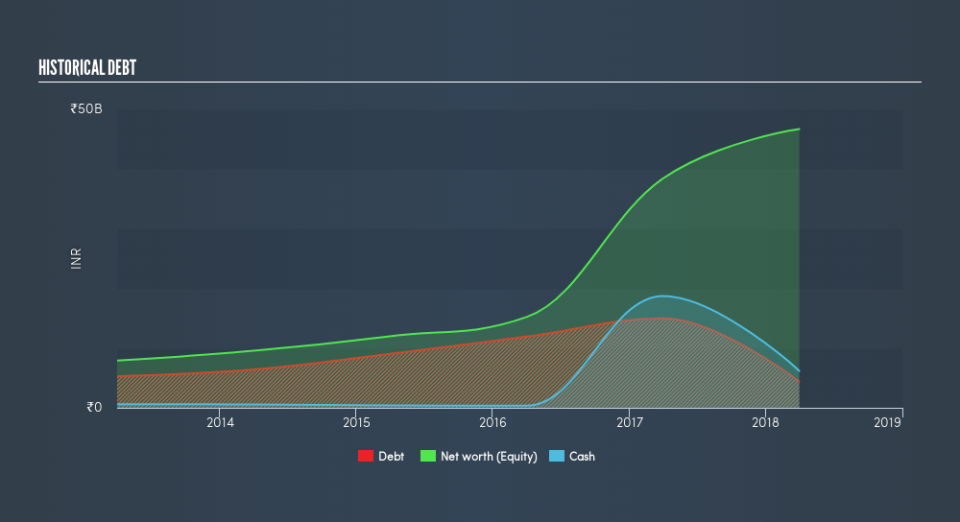All You Need To Know About Avenue Supermarts Limited's (NSE:DMART) Financial Health

Avenue Supermarts Limited (NSE:DMART), a large-cap worth ₹912b, comes to mind for investors seeking a strong and reliable stock investment. Most investors favour these big stocks due to their strong balance sheet and high market liquidity, meaning there are an abundance of stock in the public market available for trading. In times of low liquidity in the market, these firms won’t be left high and dry. They are also relatively unaffected by increases in interest rates. Today I will analyse the latest financial data for DMART to determine is solvency and liquidity and whether the stock is a sound investment.
View our latest analysis for Avenue Supermarts
DMART’s Debt (And Cash Flows)
DMART's debt levels have fallen from ₹15b to ₹4.4b over the last 12 months – this includes long-term debt. With this debt repayment, DMART currently has ₹6.2b remaining in cash and short-term investments to keep the business going. On top of this, DMART has generated cash from operations of ₹7.3b during the same period of time, leading to an operating cash to total debt ratio of 166%, meaning that DMART’s operating cash is sufficient to cover its debt.
Does DMART’s liquid assets cover its short-term commitments?
At the current liabilities level of ₹6.9b, it seems that the business has been able to meet these obligations given the level of current assets of ₹20b, with a current ratio of 2.88x. The current ratio is calculated by dividing current assets by current liabilities. For Consumer Retailing companies, this ratio is within a sensible range since there is a bit of a cash buffer without leaving too much capital in a low-return environment.
Does DMART face the risk of succumbing to its debt-load?
A debt-to-equity ratio threshold varies depending on what industry the company operates, since some requires more debt financing than others. As a rule of thumb, a financially healthy large-cap should have a ratio less than 40%. With a debt-to-equity ratio of 9.4%, DMART's debt level is relatively low. DMART is not taking on too much debt commitment, which may be constraining for future growth. We can test if DMART’s debt levels are sustainable by measuring interest payments against earnings of a company. As a rule of thumb, a company should have earnings before interest and tax (EBIT) of at least three times the size of net interest. In DMART's case, the ratio of 95.8x suggests that interest is amply covered. Large-cap investments like DMART are often believed to be a safe investment due to their ability to pump out ample earnings multiple times its interest payments.
Next Steps:
DMART has demonstrated its ability to generate sufficient levels of cash flow, while its debt hovers at a safe level. In addition to this, the company exhibits proper management of current assets and upcoming liabilities. Keep in mind I haven't considered other factors such as how DMART has been performing in the past. I recommend you continue to research Avenue Supermarts to get a better picture of the stock by looking at:
Future Outlook: What are well-informed industry analysts predicting for DMART’s future growth? Take a look at our free research report of analyst consensus for DMART’s outlook.
Valuation: What is DMART worth today? Is the stock undervalued, even when its growth outlook is factored into its intrinsic value? The intrinsic value infographic in our free research report helps visualize whether DMART is currently mispriced by the market.
Other High-Performing Stocks: Are there other stocks that provide better prospects with proven track records? Explore our free list of these great stocks here.
We aim to bring you long-term focused research analysis driven by fundamental data. Note that our analysis may not factor in the latest price-sensitive company announcements or qualitative material.
If you spot an error that warrants correction, please contact the editor at editorial-team@simplywallst.com. This article by Simply Wall St is general in nature. It does not constitute a recommendation to buy or sell any stock, and does not take account of your objectives, or your financial situation. Simply Wall St has no position in the stocks mentioned. Thank you for reading.

